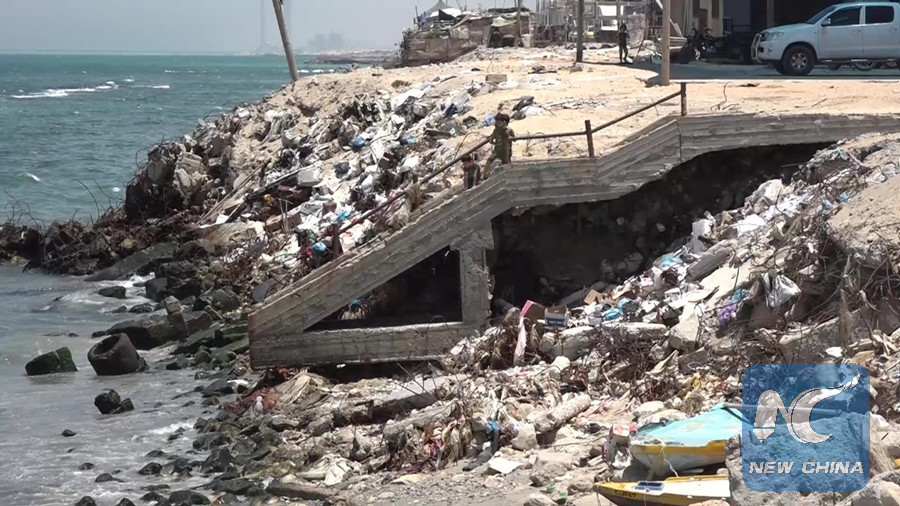
The United Nations (UN) has previously warned that Gaza, which mainly relies on its coastal aquifer to secure drinking water to its 2 million people, would be unlivable in 2020 due to shortage of water resources. (Xinhua)
GAZA, March 23 (Xinhua) -- Palestinians are racing against time to find solutions to the acute water shortage in the Israeli-besieged Gaza Strip before year 2020.
The United Nations (UN) has previously warned that Gaza, which mainly relies on its coastal aquifer to secure drinking water to its 2 million people, would be unlivable in 2020 due to shortage of water resources.
Palestinians have to improve the deteriorating water situation in Gaza, as fast as they can.
A conference in Brussels, co-chaired by the European Union and the Palestinian Authority, mobilized financial support of about 560 million U.S. dollars for the construction of Gaza Central Desalination Plant which will provide a minimum of 55 million cubic meters of safe and clean drinking water per year to the people in dire need.
Vice chairman of the Palestinian Water Authority, Ribhi Sheikh, told Xinhua that the desalination plant project is one of the main components of the strategic plan to save the water in Gaza.
He explained that the project is based on desalinating the sea water, which in the first phase will produce 55 million cubic meters annually.
He points out that water mixing tanks are intended to mix desalinated water with aquifer water in order to reduce groundwater depletion.
According to Sheikh, the central desalination plant will serve the entire population of the Gaza Strip, while the project will cost about 650 million dollars.
"The international community pledged to provide about 80 percent of the amount," he said.
The Palestinian Water Authority has prepared the tender documents and preliminary designs for the project of the plant, expecting to start the project after finalizing some arrangements with donors such as signing the necessary agreements and adopting mechanisms of implementation.
The project includes the desalination plant itself, power supply installations to cover energy needs, and the construction of a north-south carrier that will distribute fresh drinking water across Gaza.
In addition to the central desalination plant project, three minor desalination plants will be built to produce 13 million cubic meters per year for domestic use.
"Solving the water crisis in Gaza before the year 2020 is a great obsession ... this will help solve the water crisis," Sheikh added.
The Gaza's coastal aquifer is extremely saline and is currently drying up due to overuse. It suffers from a deficit of 110 million cubic meters per year, with an annual rainfall of no more than 45 million cubic meters, as well as 55 million cubic meters from lateral flow and irrigation water.
The overpopulated territory needs 200-220 million cubic meters of water a year.
More than 90 percent of the population in Gaza rely on desalinated water as the only source for drinking.
There are several sources from which the population can get desalinated water such as government, non-government and private desalination plants.
Additionally, home-scale desalination units are widespread. The distribution system of desalinated water is quite complex because it is not well organized or fully supervised by the authorities.
"Water situation in Gaza is better now than it was in previous years as several areas are benefiting from desalination substations that provide residents with higher quality water for domestic use," head of Gaza Strip Coastal Municipalities Water Utility, Munther Shublaq, told Xinhua.
However, Shublaq said that the improvement is already facing obstacles, notably the power outage and the inability to provide more quantities of water.
"Still more than 97 percent of the water in Gaza is not fit for domestic use ... improvement cannot happen before the establishment of the central desalination plant and solving the electricity crisis," he revealed.
Gaza has been placed under a tight Israeli blockade since Islamic Hamas movement seized the territory by force after routing forces loyal to President Mahmoud Abbas in 2007.

